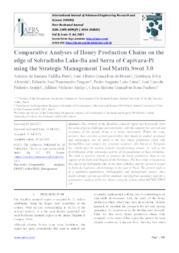Comparative analyses of honey production chains on the edge of Sobradinho Lake-Ba and serra of Capivara-Piusing the strategic management tool matrix Swot 3.0.
Comparative analyses of honey production chains on the edge of Sobradinho Lake-Ba and serra of Capivara-Piusing the strategic management tool matrix Swot 3.0.
Author(s): PADILHA NETO, A. de S.; MOURA, J. A. G. de; ALMEIDA, H. S.; FRAGOSO, E. J. N.; LIMA, P. A. L.; ARAUJO, J. L. P.; ARAUJO, E. P.; ROSA, C. S. G.
Summary: The territory of the Brazilian semiarid region has historically been the scene of great challenges and adversities, with the capacity for survival and resistance of the people living in it being represented. Within this same territory, there are also several potentialities that should be studied, developed and encouraged, one of which is the bee honey production chain with Apísmellífera type stingers for economic purposes, also known as European bee, which must be worked towards complementing income, as well as the diversification of the subsistence activity of the populations of these territories. The study in question intends to compare the honey production chain in two regions of the Semi-Arid Region of the Northeast. The first chain is located on the edge of the Sobradinho lake in the State of Bahia, and the second is ocated in Serra da Capivara, which belongs to the state of Piauí. The present study is of a qualitative-quantitative, bibliographic and documentary nature, since studies already carried out will be analyzed, starting from secondary data for a comparative analysis of the two chains, using the system called MATRIX SWOT 3.0.
Publication year: 2021
Types of publication: Journal article
Unit: Embrapa Semi-arid Region
Observation
Some of Embrapa's publications are published as ePub files. To read them, use or download one of the following free software options to your computer or mobile device. Android: Google Play Books; IOS: iBooks; Windows and Linux: Calibre.
Access other publications
Access the Agricultural Research Database (BDPA) to consult Embrapa's full library collection and records.
Visit Embrapa Bookstore to purchase books and other publications sold by Embrapa.

